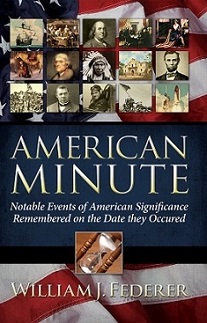“New Jersey is being invaded by Martians!”
exclaimed actor Orson Welles.

He was reading the script of a 1938 radio drama based on the novel The War of the Worlds by H.G. Wells, who died AUGUST 13, 1946.
Herbert George Wells was from an impoverished lower middle class family.
He failed as a draper and chemist assistant before going into literature.

H.G. Wells wrote many best-selling science fiction novels:
The Time Machine, 1895;
The Island of Doctor Moreau, 1896;
The Invisible Man, 1897;
The War of the Worlds, 1898;
and

The First Men in the Moon, 1901.
In 1899, at age 16, Robert Goddardread the space books of H.G. Wells, climbed a cherry tree on his family’s farm and gazed at the stars.
Goddard was inspired to go on to become the father of modern rocketry.

President Ronald Reagan referred to H.G. Wells in an address at the National Space Club, March 29, 1985:
“Dr. Goddard once wrote a letter to H.G. Wells…
‘There can be no thoughts of finishing, for aiming at the stars…is a problem to occupy generations… There is always the thrill of just beginning.'”
Reagan added:
“Personally, I like space. The higher you go, the smaller the Federal Government looks.”

Get the book, AMERICAN MINUTE-Notable Events of American Significance Remembered on the Date They Occurred

In “The War of the Worlds,” Wellswrote how Martians were finally defeated by simple bacteria:
“In another moment I had scrambled up the earthen rampart and stood upon its crest …
and scattered about … were the Martians-dead!-slain by the putrefactive and disease bacteria against which their systems were unprepared; slain as the red weed was being slain; slain,
after all man’s devices had failed, by the humblest things that God, in his wisdom, has put upon this earth.”

Wells ended:
“The torment was over. Even that day the healing would begin. The survivors of the people scattered … like sheep without a shepherd … would begin to return …
The hand of the destroyer was stayed … At the thought I extended my hands towards the sky and began thanking God.”

H.G. Wells wrote in Outlines of History (NY: MacMillian Co., 1920, Vol. 2, p. 13):
“Because Mohammed too founded a great religion, there are those who write of this evidently lustful and rather shifty leader as though he were a man to put beside Jesus of Nazareth or Gautama or Mani.
But it is surely manifest that he was a being of commoner clay; he was vain, egotistical, tyrannous, and a self-deceiver; and it would throw all our history out of proportion if, out of an insincere deference to the possible Moslem reader, we were to present him in any other light.”

H.G. Wells wrote in The Pocket History of the World (August, 1941):
“Ideas of human solidarity, thanks to Christianity, were far more widely diffused in the newer European world, political power was not so concentrated,
and the man of energy anxious to get rich turned his mind, therefore, very willingly from the ideas of the slave and of gang labour to the idea of mechanical power and the machine.”

In Outlines of History, (NY: MacMillian Co., 1920), H.G. Wells commented of the U.S. Constitution:
“Its spirit is indubitably Christian.”

In the destructiveness of World War I, writers expressed an attitude of disillusionment, such as:
-John McCrae’s “In Flanders Field” (1915);
-Wilfred Owen’s “Anthem for Doomed Youth (1917);
-Erich Maria Remarque’s “All Quiet on the Western Front” (1928); and
-Ernest Hemingway’s “A Farewell to Arms” (1929).

At this time, H.G. Wells, who admitted to becoming a skeptic around age 12, wrote God the Invisible King (1917), in which he took a critical view of traditional religious beliefs.
He later repudiated much of it as a reaction to the War (Experiment in Autobiography,1934):
“I thought it was pitiful that (men) … should pin their minds to ‘King and Country’ and suchlike claptrap, when they might live and die for greater ends, and I did my utmost to personify and animate a greater, remoter objective in God the Invisible King.
In What Are We to Do with Our Lives? (1932) I make the most explicit renunciation and apology for this phase of terminological disingenuousness.”

Though initially against a Jewish homeland, after the Nazi holocaust atrocities H.G. Wells changed to supporting the Jews.
He even initiating correspondence with chemist Chaim Weizmann, the future first President of the State of Israel. (David Lodge, The Man of Parts, Harvill Secker, 2011, p. 403):
“My own … tactlessness, aroused the resentment of Jews who are essentially at one with me in their desire for a sane equalitarian world order. For centuries the Jewish community, whatever its Old Testament tradition, has been the least aggressive of all nationally conscious communities. Mea Culpa.”

In The Secret Places of the Heart, 1922, H.G. Wellsreflected:
“Sir Richmond and Miss Grammont went out into the moonlit gloaming…crossed the bridge…and followed the road beside the river towards the old Abbey Church, that Lantern of the West…
Said Sir Richmond…’It’s only through love that God can reach over from one human being to another. All real love is a divine thing.”

In The Outline of History(1920), H.G. Wells wrote regarding future generations:
“Education is the preparation of the individual for the community, and his religious training is the core of that preparation.”

Get the book, AMERICAN MINUTE-Notable Events of American Significance Remembered on the Date They Occurred